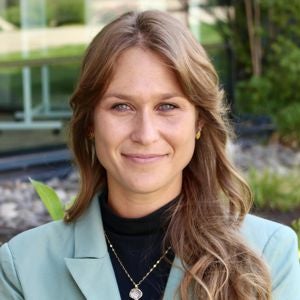- Assistant Professor
- Email: amanda.alker@uri.edu
Research
The overarching goal of the Alker Lab is to develop genetic engineering and synthetic biology tools for non-model bacteria to investigate molecular mechanisms of microbial interactions and symbiosis. While classical approaches in bacterial genetics required isolating bacteria from their environment to be able to perform DNA manipulations, a promising new technology called CRISPR-associated Transposons (CASTs) enables microbiome editing through integration of large DNA cargos in a site- and species-specific manner. The Alker Lab is focused on adapting CASTs to target new bacteria and identifying mechanisms of editing selection and enrichment (i.e. metabolic niches) that do not rely on the delivery of antibiotic resistance genes. We are interested in using model systems to deploy these technologies and address the following questions:
- Can we retrieve targeted bacteria from complex microbiomes for further study?
- Can we edit a host-associated microbiome to selectively suppress pathogens or virulence genes?
- Can we engineer resident microbiota to outcompete pathogens?
- Can we co-opt bacteria with endogenous CASTs?
Research topics: Microbiology, microbiomes, genome editing, CRISPR, host-microbe symbiosis
Education
Postdoctoral Fellow, Innovative Genomics Institute at University of California, Berkeley (2023-2025)
Ph.D. Cell and Molecular Biology, Joint Doctoral Program at University of California, San Diego and San Diego State University (2016-2022)
Honors B.A. Biology with Marine Science Concentration, Harriet L. Wilkes Honors College at Florida Atlantic University (2011-2015)
Selected Publications
Song L*, Alker AT*, Oromí-Bosch A, Swartz S, Martinson J, Arora J, Wang A, Rovinsky R, Smith S, Pierce E, Deutschbauer A, Doudna J, Cress B, Rubin B. Identification of Proteins Influencing CRISPR-Associated Transposases for Enhanced Genome Editing. bioRxiv. 2024 September 15; :2024.09.11.612086. *Authors contributed equally.
Alker AT, Farrell MV, Demko AM, Purdy TN, Adak S, Moore BS, Sneed JM, Paul VJ, Shikuma NJ. Linking bacterial tetrabromopyrrole biosynthesis to coral metamorphosis. ISME Commun. 2023 Sep 19;3(1):98. PubMed Central PMCID: PMC10509201.
Alker AT, Farrell MV, Aspiras AE, Dunbar TL, Fedoriouk A, Jones JE, Mikhail SR, Salcedo GY, Moore BS, Shikuma NJ. A modular plasmid toolkit applied in marine bacteria reveals functional insights during bacteria-stimulated metamorphosis. mBio. 2023 Aug 31;14(4):e0150223. PubMed Central PMCID: PMC10470607.
Alker AT, Delherbe N, Purdy TN, Moore BS, Shikuma NJ. Genetic examination of the marine bacterium Pseudoalteromonas luteoviolacea and effects of its metamorphosis-inducing factors. Environ Microbiol. 2020 Nov;22(11):4689-4701. PubMed Central PMCID: PMC8214333.
Cavalcanti GS, Alker A., Delherbe N, Malter K, Shikuma NJ The Influence of Bacteria on Animal Metamorphosis. Annual Reviews of Microbiology. September 2020, 74:1,137-158; DOI: 10.1146/annurev-micro-011320-012753
Rojas MI, Cavalcanti GS, McNair K, Benler S, Alker AT, Cobián-Güemes AG, Giluso M, Levi K, Rohwer FL, Bailey BA, Beyhan S, Edwards RA, Shikuma NJ. A Distinct Contractile Injection System Found in a Majority of Adult Human Microbiomes. mSystems. July 2020, 5 (4) e00648-20; DOI:10.1128/mSystems.00648-20

